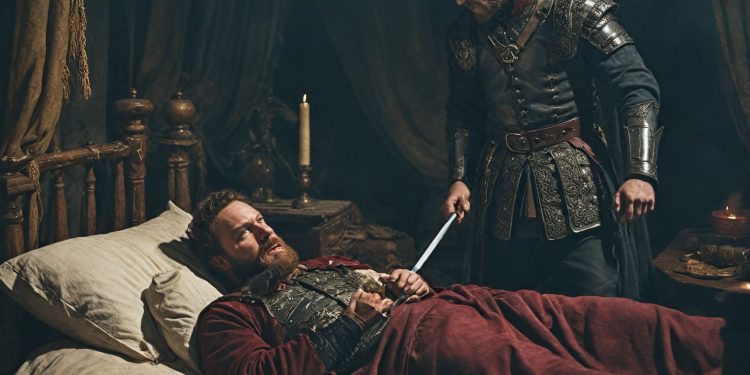Have you ever wondered why Macbeth did something so terrible? In Shakespeare’s tragedy “Macbeth,” there is a question: Why did Macbeth kill King Duncan? It is a story full of secrets, where a good person turns bad because they want something dear. That’s what happens to Macbeth. He gets tempted by power and some strange prophecies from three women. After that he makes a really bad choice. But what is the reason? Let’s explore the reasons and find out why did Macbeth kill King Duncan.
How Macbeth Killed Duncan
Macbeth enters silently into King Duncan’s room one night when everyone is sleeping. It’s really dark, and he can barely see anything except for a little light from a candle. Macbeth’s heart is beating so loudly that he is worried that someone might hear it! He comes closer to the bed where Duncan is sleeping. Duncan is looking all peaceful and unaware.
Macbeth’s hand shakes as he raises a sharp knife that he brought with him. He is scared and not sure if he should do it. But he remembers what his wife said about becoming king. So, he takes a deep breath and stabs Duncan with the knife. There’s a sudden gasp. And Macbeth’s hands are all covered in blood. He feels really scared and guilty. Because he knows he’s done something really wrong. And that’s how everything starts going bad for Macbeth.
Why Did Macbeth Kill King Duncan?
Macbeth actually decides to kill King Duncan because he really wants to become king. He got this idea of becoming king from some strange ladies that he would be king in the future. This ambitious idea gets into his head. His wife is more ambitious and she keeps telling him he’s not brave enough if he doesn’t do it. So, Macbeth feels like he has to prove himself and goes ahead with the plan. It’s like he entangles himself in a big mess because he can’t say no to what he thinks he wants. Here is an in depth analysis of why did Macbeth kill King Duncan.
Macbeth’s Ambition
Macbeth had a good personality but his hunger for power got the better of him. When he hears the prophecy from those witches, his ambition rises like fire. He can’t stop thinking about being king. Even though it means doing something really wrong, now he is in a battle with himself. It’s a battle between what he knows is right and what he wants in the long run. And when Lady Macbeth shares her idea with him, she just adds fuel to the fire. Now he feels more pressured to go through with it. So, it is Macbeth’s ambition that becomes a powerful force that drags him deeper and deeper into darkness, to the point where he cannot come back.
The Witches Spell Macbeth
The prophecy of the witch surprises him because he’s just a normal person. He thinks he is not someone who usually becomes a king. But this makes him very confused. He wonders, “What if they’re right? What if I really could be king?” It feels like a dream, and it makes him ponder.
So, why did Macbeth kill King Duncan? The notorious witches’ words make Macbeth feel like he’s in a fight with himself. He knows it’s bad to kill the king. He can’t forget about being king himself. It’s like a voice in his head that won’t be quiet, saying, “You have to do this.” The more he thinks about it, the more he wants it. Although he’s scared and unsure, he feels attracted towards doing something really wrong because of what the witches said and committing that heinous act. Finally, he does exactly that.
Manipulation in Macbeth
Macbeth easily listens to manipulative people like Lady Macbeth. She tells him he’s not brave if he doesn’t become king. This makes Macbeth determined to prove himself. He is even ready to do something really bad. He abides by her because he wants to show he’s not scared.
When Lady Macbeth shares the idea of becoming queen, Macbeth feels like he has to do what she says. He knows it’s not right, but he wants to make her happy. It’s like he can’t say no to her, even though he knows it’s wrong. So he goes ahead with the plan to kill the king, even though he’s not sure if it’s the right thing to do.
Why Did Lady Macbeth Manipulate Macbeth into Killing King Duncan? Lady Macbeth manipulates Macbeth to kill King Duncan because she thinks it will fulfil their dream of power and status. She sees Macbeth as weak and believes she needs to push Macbeth to commit regicide. She uses bird imagery to show her emotions. After that, they can seize the throne and secure their place in society. Ultimately, her manipulation makes Macbeth kill the king out of a desire for personal gain. They show a willingness to do whatever it takes to achieve it. They are even ready to sacrifice morality and integrity. This is another compelling reason for why did Macbeth kill King Duncan.
Fear of losing control and Status
Macbeth is very scared of losing his power and importance. He’s an important person in the kingdom. He is like an idol, and everyone looks up to him. But when the idea of owning the throne comes to his mind, he starts worrying about how to grab that chance. He is losing his allies. Humble people like Ross and other noble men are leaving him. Not being in control of his own future makes him really afraid. He’s worried that if he doesn’t do something big enough, he could lose everything he has achieved so far.
Macbeth is also afraid of losing his status in society. Everyone around him is used to respecting and admiring him. The thought of not being seen as important anymore makes him scared. He doesn’t want to lose the respect of his friends and the good life he has. So, the fear of losing control and status makes him do some really bad things, and he eventually kills the king.
Dwindling Morality in Macbeth Personality
Macbeth wants more power, so he starts doing evil things. He knows hurting someone, whoever it is, especially the king, is wrong. But he becomes greedy for power, and over time, the sense of morality fades away. He’s ready to do anything to be in charge of the situation, even if it’s really bad.
Macbeth’s actions become darker over time, and his intentions make us think he is a gothic villain. He thinks it’s okay to do bad stuff if it helps him stay powerful. We wonder why did Macbeth kill King Duncan? Because he is already in charge of an army. This shows how wanting power can make good people do malicious things. Macbeth breaks many rules when his lust for power grows and he is willing to do whatever is necessary to get what he wants. This leads him down a path of moral corruption. He justifies his actions by telling himself that the ends justify the means, like a Machiavellian hero. Ultimately, this fall into darkness marks a tragic shift in Macbeth’s character, as he sacrifices his morals in pursuit of power.
Hubris in Macbeth
Hubris in Macbeth is another answer to the following question: Why did Macbeth kill King Duncan? Macbeth’s pride and arrogance make him believe that he is destined for greatness. He does not believe morality and righteousness. His sense of invincibility keeps growing as he becomes more fixated on achieving kingship. Macbeth falsely believes that he is not bound by any rules. He also believes that nothing can stand in his way of power.
The hubristic belief in his own destiny eventually leads Macbeth to do what he should not do and make reckless decisions. This ultimately leads to his own downfall. He becomes so convinced of his own greatness that he ignores the consequences of his actions. Macbeth’s hubris or excessive pride becomes his tragic flaw, because his arrogance blinds him and he is now focused on immediate satisfaction. This prevents him from seeing the consequences of his choices. Eventually, he suffers intolerably and faces death in the hand of Macduff
To Conclude
We witness the tragic ending of Macbeth in Shakespeare’s masterful tragedy “Macbeth” because of his ambition and moral decay. Shakespeare wants to tell us about the dangers of surrendering to temptation and corrupting desire. His downfall serves as a cautionary tale, highlighting the weakness of human nature and the destructive power of hubris. Machbeth’s downfall is an example of power hungry individuals and the result of their unchecked desire. Forcing us to think about why did Macbeth kill King Duncan, Shakespeare challenges us to confront our own desires and moral depth.



Comments 1